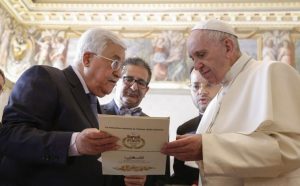The United States’ recognition of Jerusalem as Israel’s capital (and the latest statement by US Secretary of State Mike Pompeo legitimizing the Israeli settlements in the heart of the Palestinian territory under the pretext of responding to Christian Evangelical voices) was not only part of an orchestrated effort by Trump officials to undermine international law and the international system as a whole, it also showed how Christians in the Middle East, and particularly in Palestine, continue to be negatively affected by decisions taken by those who claim to care about “Christianity.” The fact that no Christian leader in Palestine or Egypt agreed to meet Vice President Pence on his last visit was a strong statement of rejection towards American policies.
The developments since then have been negative. Nobody could claim that any step taken by the Trump administration has brought us any closer to peace. It has become clear though that the rest of the international community has to take concrete steps to advance the cause of a just and lasting peace. The case of Palestinian Christians, in particular, dramatically affected since the massive expulsions during the Nakba in 1948, could serve as an entry point for many in the West to understand the magnitude of the catastrophe suffered by the Palestinian people and the urgent need to bring a just and lasting peace to the Holy Land through the restoration of the inalienable rights of the Palestinian people.
What some in the West have tried to do, including those in the Trump administration, is to dehumanize the Palestinians in their struggle for freedom and self-determination, including trying to impose stereotypes that serve their interests of legitimizing and normalizing occupation and colonization. In this context, the use of Christian symbols has become a norm for right-wing populists, something that the Israeli government has used for the benefit of its colonialist enterprise. This is an insult not only to the very basic values of Christianity but also to the history and the struggle of Palestinian Christians in their homeland.
In fact, Christian Arab intellectuals were among the pioneers of Arab nationalism that opposed the Ottoman Empire and later resisted the British Mandate and its plans to undermine the right of the Palestinians to live in freedom and dignity in their land. The Nakba of 1948 was catastrophic for all Palestinians, including Palestinian Christians: Dozens of Christian communities were pushed out of their homes. Despite the fact that some Western Christians have tried to portray the creation of Israel as a “divine will,” the consequences suffered since then by the indigenous Christian population present a different story, closer to a “Via Dolorosa” than to “Resurrection.” It is estimated that around two-thirds of the Palestinian Christian population became refugees in 1948.

After the Israeli occupation of 1967, when Israel occupied by force the remaining 22 percent of historical Palestine, another process was seen: While this war did not create an influx of refugees as high in number as that of the Nakba, the Israeli plan was to take as much land as possible through the construction of a colonial-settlement enterprise. One of the most important areas of focused colonization was occupied East Jerusalem and its surroundings. Israel’s policy of grabbing as much land as possible was combined with attempts to limit the Palestinian presence, whether by controlling the Palestinian population registry or by literally withdrawing the residency rights of Palestinians from Jerusalem. Thus the Palestinian Christians are those most affected by such policies, and this American administration has no limits in blindly supporting Israel’s policies.
It was no surprise to hear the words of the American ambassador to Israel, Mr. David Friedman, on the first anniversary of the American Embassy’s move to Jerusalem: “Israel has one secret weapon that no other country has. Israel is on the side of God.” In other words, the American ambassador is endorsing the exclusivity approach, stressing the sole rights of Israel, implying that others do not count.
Within this context, the Israeli confiscation of the Cremisan lands in Bethlehem Governorate that belong to 58 Palestinian Christian families would become legitimate in the eyes of the American officials. In addition, the complaint by the heads of churches to one of Trump’s envoys about the settlers’ illegal attempts to control the church properties at Jaffa Gate, the main entrance to all the churches as well to the Holy Sepulcher, fell on deaf ears. And closing down the Holy Sepulcher by the heads of churches in protest against the attempts by the Israeli side to impose taxes on them in violation of the historical “status quo” was also a message to the Israeli government: “Enough is enough!” It was also a message to the American administration that the indigenous Christians in the Holy Land are angry. The Trump administration should refer to the communiqué of the local church addressed to President Trump (December 6, 2017) to understand better where they stand, as well as to the one related to their position regarding the unilateral recognition by the administration of Jerusalem as the capital of Israel.
Accordingly, the steps taken by the Trump administration have only worsened the situation on the ground. By enabling Israel to move ahead with its policies that deny the Palestinian right to self-determination, the prospects of a political solution continue to diminish, and many wonder whether any future for a viable Christian presence in the Holy Land remains. Palestinian Christian religious leaders continue to remind their congregations of the importance of keeping hope alive. But what does hope mean for Palestinians in their present situation? The need for concrete measures to enable the exercise of their long overdue rights matters more than ever if the prospects of peace are to be maintained. Waiting for the Trump administration to present its plan aimed at legitimizing Israeli violations of international law is not the answer.
One of the most important examples is the fact that Christians from the rest of the region are prevented from praying in the Holy Land. Those with Israeli military permits to access Jerusalem may get closer to their holy sites, as those in Jerusalem will continue to wonder about their residency status while continuing to struggle for their freedom and dignity in light of unjust policies related to their very rights in their own rooted city. The decisions taken by the Trump administration that claim to care about the “rights of Christians” in the Middle East are hence paradoxical.


